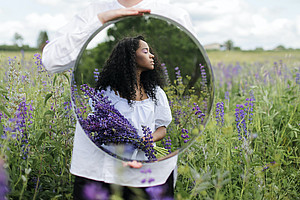How well do we know our talents?
In the course of our lives, we often have to assess our abilities or talents, for example when it comes to whether we can meet the requirements of a job or whether we have prepared sufficiently for an exam. In some areas, however, such self-assessments correlate surprisingly poorly with objective indicators of aptitude (e.g. performance in an intelligence test). So while some people have a realistic idea of their own performance, others overestimate or underestimate themselves.
In everyday life, however, assessments by others are also relevant: On the one hand, people close to us could support us with (accurate) feedback when making (e.g. professional) decisions. On the other hand, people we don't know sometimes need to get a quick picture of a person's characteristics and talents, for example in job interviews or on first dates. In our studies, we have found that assessments by others, e.g. partners or good friends, are similarly accurate and sometimes even more accurate than self-assessments. However, there are also indications of bias in external assessments, especially when it comes to first impressions, for example.
We are primarily concerned with self-assessments and external assessments of aptitudes (e.g. intelligence or social-emotional abilities). Specifically, we investigate how accurate such assessments are, how individual differences in assessments can be explained and how assessments can be improved. Through our research, we also aim to help identify and-ideally-reduce possible negative consequences of misperceptions.

Selected publications:
Neubauer, A. C., Pribil, A., Wallner, A., & Hofer, G. (2018). The self-other knowledge asymmetry in cognitive intelligence, emotional intelligence, and creativity. Heliyon, 4(12), e01061. https://doi.org/10.1016/j.heliyon.2018.e01061
Neubauer, A. C., & Hofer, G. (2021). Self-estimates of abilities are a better reflection of individuals' personality traits than of their abilities and are also strong predictors of professional interests. Personality and Individual Differences, 169, 109850. https://doi.org/10.1016/j.paid.2020.109850
Hofer, G., Langmann, L., Burkart, R., & Neubauer, A. C. (2022). Who knows what we are good at? Unique insights of the self, knowledgeable informants, and strangers into a person's abilities. Journal of Research in Personality, 98, 104226. https://doi.org/10.1016/j.jrp.2022.104226
Hofer, G., Macher, S., & Neubauer, A. C. (2022). Love is not blind: What romantic partners know about our abilities compared to ourselves, our close friends, and our acquaintances. Journal of Research in Personality, 98, 104211. https://doi.org/10.1016/j.jrp.2022.104211
Hofer, G., Mraulak, V., Grinschgl, S., & Neubauer, A. C. (2022). Less-intelligent and unaware? Accuracy and Dunning-Kruger effects for self-estimates of different aspects of intelligence. Journal of Intelligence, 10(1), Article 1. https://doi.org/10.3390/jintelligence10010010